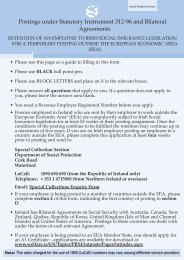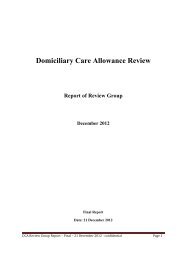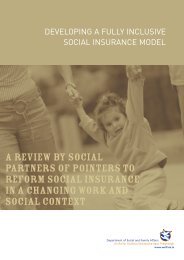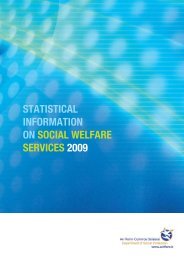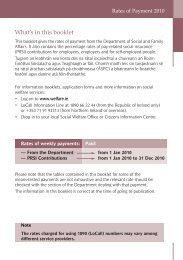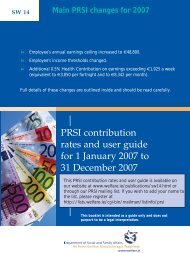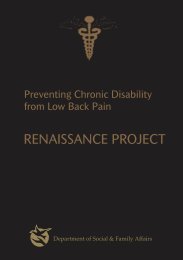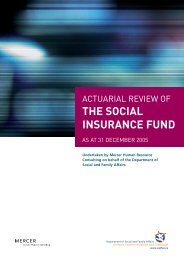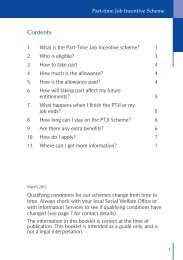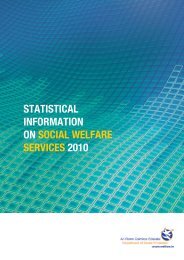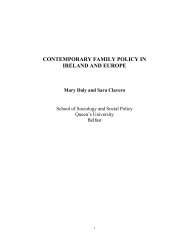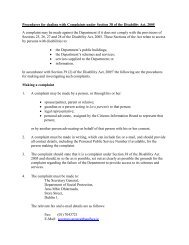department of social and family affairs annual report 2006 - Welfare.ie
department of social and family affairs annual report 2006 - Welfare.ie
department of social and family affairs annual report 2006 - Welfare.ie
You also want an ePaper? Increase the reach of your titles
YUMPU automatically turns print PDFs into web optimized ePapers that Google loves.
Appendix to Chapter 5<br />
> Developments under the Special<br />
Projects Fund<br />
The special projects fund allows the Department <strong>of</strong><br />
Social <strong>and</strong> Family Affairs an opportunity to impact<br />
on <strong>social</strong> inclusion <strong>and</strong> improve employability in a<br />
very positive way. These projects have given much<br />
help by way <strong>of</strong> intensive training, counselling <strong>and</strong><br />
other supports to groups at risk <strong>of</strong> developing longterm<br />
welfare dependency.<br />
The special projects initiative demonstrates the<br />
positive results <strong>of</strong> a partnership approach between<br />
the Department, the Voluntary & Community<br />
Sector <strong>and</strong> other local players in identifying <strong>and</strong><br />
addressing local needs in terms <strong>of</strong> training <strong>and</strong><br />
development.<br />
The groups who need special help <strong>of</strong> this type<br />
include the very long-term unemployed, travellers,<br />
people with literacy difficult<strong>ie</strong>s, lone parents,<br />
the long-term ill <strong>and</strong> people with disabilit<strong>ie</strong>s.<br />
Some <strong>of</strong> the projects supported include personal<br />
development, computer training <strong>and</strong> ‘start your<br />
own business’ courses.<br />
Planning formed the basis <strong>of</strong> the course. The aim <strong>of</strong><br />
the programme was to encourage the participants<br />
to focus on their long term future rather than the<br />
short term.<br />
By the end <strong>of</strong> the course all <strong>of</strong> the participants had<br />
completed a CV. Each participant had a career plan<br />
which laid out the skills they have, areas they might<br />
wish to seek employment <strong>and</strong> suggested stages <strong>of</strong><br />
how they might get there. Many <strong>of</strong> the participants<br />
chose to return to education as a way <strong>of</strong> moving<br />
forward in their careers.<br />
* Inroads Programme for Lone<br />
Parents in Ballyfermot, Dublin<br />
This was a personal development, career guidance<br />
<strong>and</strong> counselling programme focused on young<br />
very vulnerable lone parents. The objective was<br />
to bring the participants to the point where they<br />
could access mainstream education, training<br />
or employment. Fourteen participants were<br />
recruited through contact with front line services<br />
such as Public Health nurses <strong>and</strong> Home School<br />
Liaison staff. The Ballyfermot Social Intervention<br />
Initiative arranged childcare <strong>and</strong> provided general<br />
administration for the programme.<br />
Goal 2: people <strong>of</strong> working age<br />
From January to December <strong>2006</strong>, over 160 projects<br />
were funded at a total cost <strong>of</strong> €2.9 million.<br />
Some examples <strong>of</strong> projects funded under the<br />
Special Projects Fund in <strong>2006</strong> follow:<br />
* Job Seeking & Communication<br />
Skills Programme for the Young<br />
Unemployed in Cork City<br />
This programme was targeted at 18 year olds on<br />
the Live Register. Most <strong>of</strong> the participants had<br />
completed the Leaving Certificate but had little<br />
or no direction since leaving school. Some would<br />
have come from a background <strong>of</strong> long-term<br />
unemployment.<br />
The programme was delivered to 18 participants<br />
over two mornings a week for a period <strong>of</strong> twelve<br />
weeks <strong>and</strong> was completed in September <strong>2006</strong>.<br />
Social <strong>and</strong> Job Seeking Skills, Computers <strong>and</strong> Career<br />
Initially participants had very little self-confidence,<br />
no interest in returning to education <strong>and</strong> felt<br />
a sense <strong>of</strong> isolation. Apart from the personal<br />
development <strong>and</strong> confidence building elements, a<br />
very worthwhile feature <strong>of</strong> the programme were<br />
the f<strong>ie</strong>ld visits to a number <strong>of</strong> colleges. By the end<br />
<strong>of</strong> the ten week programme most participants<br />
had committed to returning to complete their<br />
education.<br />
The programme succeeded in addressing barr<strong>ie</strong>rs<br />
to participation for this target group in a number <strong>of</strong><br />
ways: for example, by providing adequate childcare<br />
<strong>and</strong> by providing transport from surrounding<br />
estates to the training centre.<br />
A follow-on ten week programme with ten<br />
participants was completed in June. This<br />
programme was designed to dovetail with<br />
mainstream education provision <strong>and</strong> this was<br />
facilitated by Inchicore College <strong>of</strong> Further Education<br />
who provided a return to education feeder<br />
32



